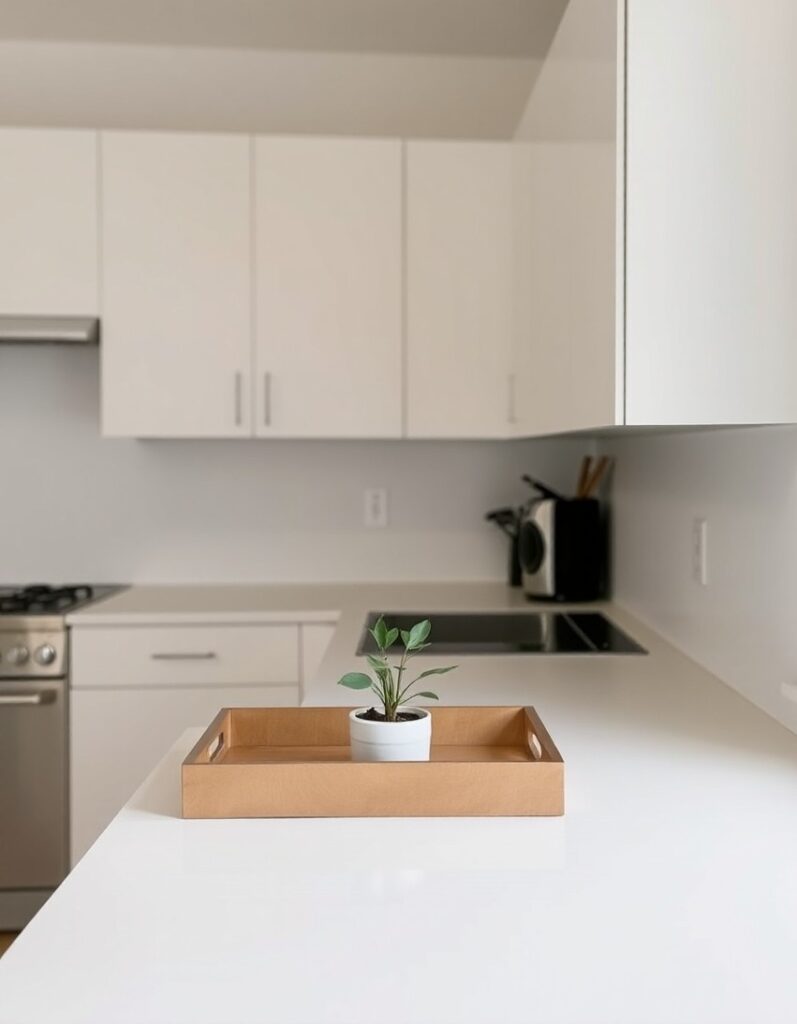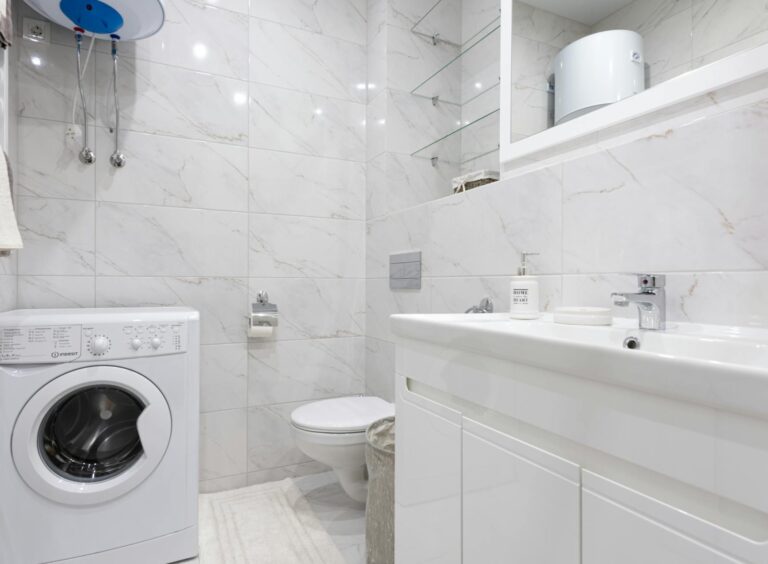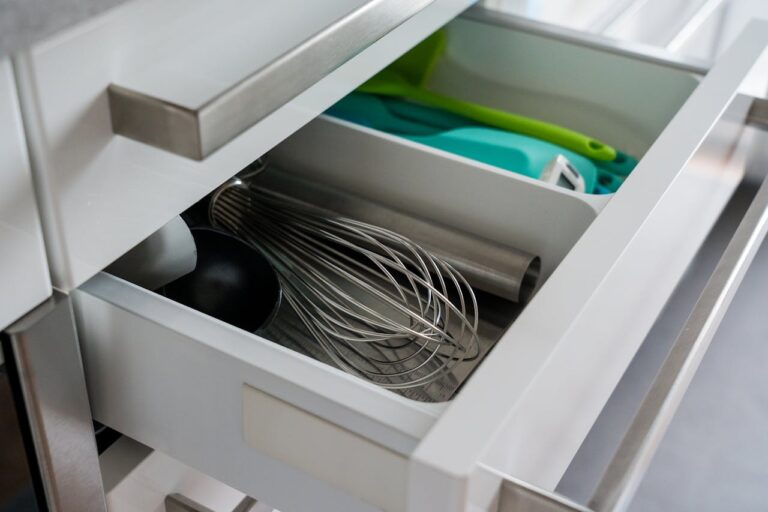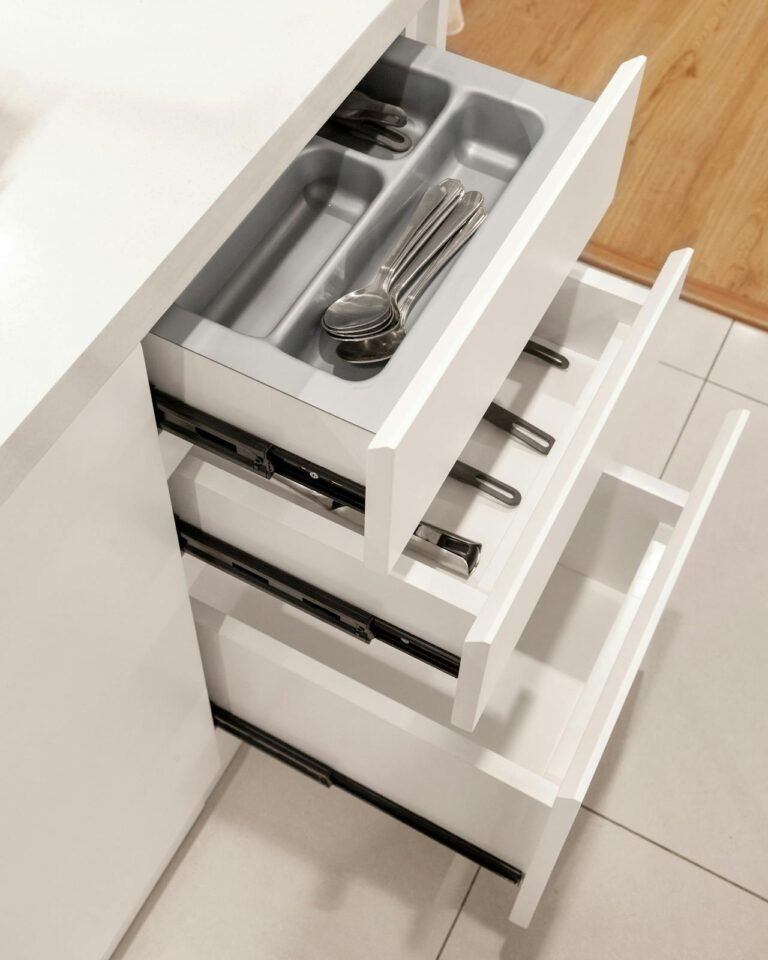This site contains affiliate links, view the disclosure for more information.
Clutter tends to accumulate in kitchens faster than anywhere else. Between meal prep, snacks, mail, and everyday items that drift onto counters, surfaces fill up quickly. Building a few simple kitchen habits that prevent clutter can change how the space functions throughout the day.
Why Kitchen Clutter Happens So Quickly

Kitchens serve multiple purposes beyond cooking. They become drop zones for keys, paperwork, and random items that need a temporary home. Without intentional systems in place, these items pile up. Small daily habits create barriers that stop clutter before it starts, rather than dealing with overwhelming cleanup sessions later.
1. Clear Counters Right After Each Meal
Leaving dishes or food containers on the counter creates a ripple effect. Once one item sits out, adding more feels natural. Taking two minutes to clear surfaces immediately after eating prevents this pattern. Rinse dishes and load them directly into the dishwasher, or wash them right away if hand-washing. Wipe down the counter before moving on.
This habit works because it treats cleanup as part of the meal itself, not a separate task to handle later.
2. Designate One Spot for Incoming Items That Don’t Belong in the Kitchen
Mail, shopping bags, and random objects naturally land on kitchen counters. Instead of fighting this tendency, work with it. Create a designated landing zone near the kitchen entrance—a small basket, tray, or wall-mounted organizer works well. When items arrive, they go directly into this spot rather than spreading across counters.
Check and empty this zone every evening to prevent overflow.
3. Put Away Ingredients While Cooking Instead of After
Waiting until after cooking means dealing with tired motivation and a sink full of dishes. Returning ingredients to their spots during cooking keeps counters clearer and makes cleanup faster. While something simmers or bakes, put the flour back in the pantry or return the olive oil to its shelf.
This approach breaks organizing into smaller moments throughout the cooking process.
Read More: How To Stop Your Small Bathroom From Feeling Cluttered
4. Keep Only Frequently Used Appliances on Counters
Countertop space disappears quickly when multiple appliances sit out permanently. Coffee makers and toasters might earn their spots through daily use, but items used weekly or monthly belong in cabinets. Store the blender, stand mixer, or food processor in lower cabinets or pantry shelves for easy access without sacrificing counter space.
Fewer items on display means less visual clutter and more workspace for actual meal prep.
5. Handle Dishes Within One Hour of Use
Letting dishes sit creates mental clutter along with physical mess. Whether loading the dishwasher or hand-washing, addressing dishes within an hour prevents buildup. This timeframe feels manageable without requiring immediate action, but stops the avalanche that happens when dishes pile up over multiple meals.
Set a simple reminder if needed until this becomes automatic.
Also Read: How To Keep A Studio Kitchen Organized With Minimal Cabinets
6. Wipe Down Surfaces Each Evening Before Bed
A quick evening reset makes mornings feel more manageable. Spending three minutes to wipe counters, the stovetop, and the sink removes crumbs, spills, and sticky spots before they harden overnight. This habit also serves as a visual check—anything left on counters becomes obvious and can be dealt with immediately.
Starting each day with clean surfaces reduces the temptation to add clutter.
7. Return Items to the Same Spot Every Single Time
Consistency matters more than perfection when it comes to kitchen organization. Designating specific homes for items and returning them to those exact spots eliminates the search-and-scatter pattern that creates mess. Scissors always go in the same drawer. Cooking oils stay in the same cabinet section. Keys hang on the same hook.
This removes decision fatigue and keeps surfaces clear by default.
What Makes These Kitchen Habits Work Long-Term
These habits work because they’re brief and tied to activities already happening. None requires setting aside dedicated organizing time or major lifestyle changes. They slip into existing routines—after meals, during cooking, before bed. Building habits around existing anchors makes them sustainable rather than another item on a to-do list.
The key is starting with one or two habits rather than attempting all seven at once. Pick the ones that address the biggest clutter sources in your specific kitchen.
Read More: How To Store Dishes In A Studio Kitchen With One Cabinet
Frequently Asked Questions
How do I stop clutter from building up in my kitchen?
Focus on immediate action rather than delayed cleanup. Clear counters right after use, designate specific spots for items, and handle dishes within an hour. These small actions prevent the accumulation that leads to overwhelming messes.
What daily habits keep kitchen counters clear?
Wiping surfaces each evening, returning items to designated spots immediately, and storing infrequently used appliances create the biggest impact. These habits take minimal time but prevent clutter from taking hold.
How can I maintain a clutter-free kitchen easily?
Build habits into existing routines rather than creating separate organizing sessions. Put away ingredients while cooking, clear counters after meals, and create a landing zone for items that don’t belong in the kitchen. Consistency matters more than intensity.
What causes clutter buildup in small kitchens?
Limited counter space means items have nowhere to go, so they pile up quickly. Without designated homes for objects, surfaces become default storage. Lack of immediate cleanup after cooking or eating accelerates the problem.
How long does it take to build habits that reduce kitchen clutter?
Most habits become automatic within three to four weeks of consistent practice. Start with one or two habits rather than all at once. Once those feel natural, add another. Gradual implementation works better than attempting complete transformation overnight.
Should I organize kitchen cabinets before starting these habits?
Basic organization helps, but perfect cabinet systems aren’t necessary to start. Begin with surface-level habits like clearing counters and handling dishes. As these become routine, refining cabinet organization becomes easier because there’s less daily mess to manage.
Make Your Kitchen Work for You
Small shifts in daily kitchen habits create lasting changes in how organized the space feels. These routines don’t require extra time—they simply redirect actions that would happen anyway. Start with the habit that addresses your biggest clutter source, build from there, and watch surfaces stay clearer with less effort.



